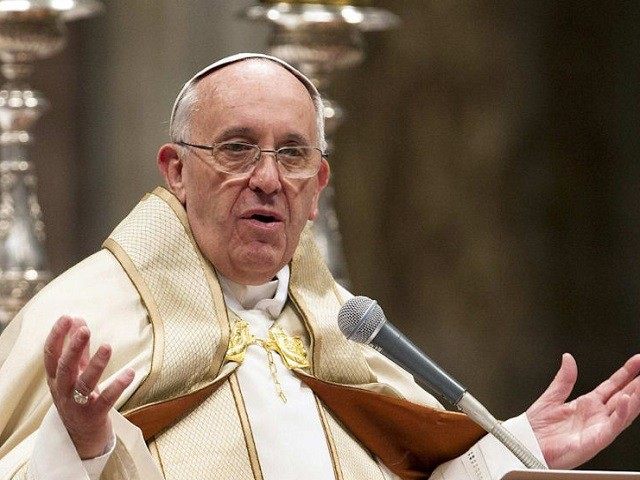In his address to the Italian Confederation of Cooperatives Saturday, Pope Francis employed muscular language in speaking about money — while acknowledging its importance to business. “Money,” he said, “is the devil’s dung.”
“It is not easy to talk about money,” Francis said. Quoting Saint Basil the Great, the Pope said: “Money is the dung of the devil! When money becomes an idol, it rules over a person’s choices. And then it ruins a person and condemns him, turning him into a slave.”
The Pope called for “creative imagination” to find new methods, attitudes and tools to combat the “culture of waste,” in which the world is immersed, “fueled by the powers that govern the economic and financial policies of the globalized world, whose center is the god of money.”
This isn’t the first time that Francis has resorted to a scatological illusion to denounce the evils of mammon. In a homily given in September 2013, the Pope used the same expression to decry wealth:
“Money becomes an idol and you worship it. This is why Jesus tells us: ‘You cannot serve the idol of money and the living God.’ Either one or the other.” Here, too, Francis called money “the devil’s dung,” insisting that “it turns us into idolaters, sickens our mind with pride and makes us enthusiasts of frivolous things that pull us away from the faith.”
Nonetheless, in Saturday’s address the Pope also recognized the necessity of capital to make financial enterprises run.
After outlining a series of tasks for the members of cooperatives, the Pope admitted: “To do all these things requires money!”
He noted that according to Catholic social teaching, “profit is not a god, but only a compass and a yardstick of business.”
“Cooperatives,” Francis said, “are generally not founded by big capitalists; indeed it is often said that they are structurally undercapitalized.” In an inadvertent nod to capitalism the Pope then insisted: “You have to invest, and you have to invest well!” In Italy, he said, “it is difficult to get public money to fill the shortage of resources.” The Pope proposed rather that people of good will pool their resources, saying they should “combine your good means to accomplish good works.”
He also suggested cooperative financial institutions and firms collaborate more often. “Pay fair wages to your workers,” he said, “investing primarily in initiatives that are truly necessary.”
Francis had nothing but praise for the work of cooperatives, underscoring the meaning of the term as “working together.” He said that by their existence cooperatives represent the value of cooperation, together reaping greater gains and sharing losses. “Cooperatives challenge everyone,” he said, “they even challenge math, because in a cooperative one plus one equals three!”
Moreover, he said, in a cooperative, “a failure is partial failure. That’s the beauty of cooperatives!”
“Cooperatives,” Francis said, “should continue to be the motor that uplifts and develops the weakest part of our local communities and civil society. Good feelings alone can’t do this. We need to prioritize the establishment of new cooperative enterprises, along with further developing existing ones, especially in order to create new job opportunities that are lacking today.”
The Pope took advantage of his meeting to denounce the black labor market, where people accept hard jobs at minimal wages out of desperation. This happens, Francis said, “because there is a waiting line, a line of people looking for work. If you don’t like it, someone else will take it.”
“Hunger makes us accept whatever is available,” he said.
He highlighted the situation of young people, noting that youth unemployment in parts of Europe reaches as high as 40 or 50 percent, destroying the hope of the young.
In the end, he said, what is most needed is to put the human person at the center of the economy: “People at the center, the most needy in the center,” he said. “This is the mission we want!”
Follow Thomas D. Williams on Twitter: @tdwilliamsrome

COMMENTS
Please let us know if you're having issues with commenting.